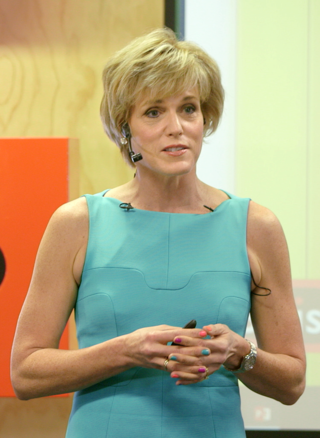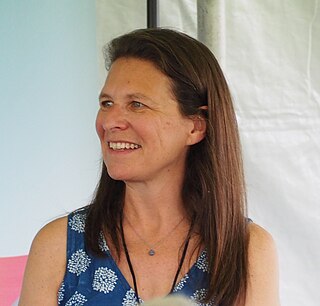Related Research Articles

Anne Elizabeth Applebaum is an American and naturalized-Polish journalist and historian. She has written extensively about the history of Communism and the development of civil society in Central and Eastern Europe.
Shannon Faulkner is an American teacher, best known for being the first female student to attend The Citadel in 1994, following a lawsuit. She currently teaches English in Greenville, South Carolina.

Gayle S. Rubin is an American cultural anthropologist, theorist and activist, best known for her pioneering work in feminist theory and queer studies.

Sharon Rich is an American author and film historian, best known for the biography Sweethearts about 1930s singing stars Jeanette MacDonald and Nelson Eddy.

Elizabeth Strout is an American novelist and author. She is widely known for her works in literary fiction and her descriptive characterization. She was born and raised in Portland, Maine, and her experiences in her youth served as inspiration for her novels–the fictional "Shirley Falls, Maine" is the setting of four of her nine novels.
Lillian Faderman is an American historian whose books on lesbian history and LGBT history have earned critical praise and awards. The New York Times named three of her books on its "Notable Books of the Year" list. In addition, The Guardian named her book, Odd Girls and Twilight Lovers, one of the Top 10 Books of Radical History. She was a professor of English at California State University, Fresno, which bestowed her emeritus status, and a visiting professor at University of California, Los Angeles (UCLA). She retired from academe in 2007. Faderman has been referred to as "the mother of lesbian history" for her groundbreaking research and writings on lesbian culture, literature, and history.

Caroline Adams Miller is an American executive coach and motivational speaker. Miller has written six books, including Getting Grit, Creating Your Best Life, and My Name is Caroline, which chronicles her struggle with bulimia.

Emily Gould is an American author, novelist and blogger who worked as an editor at Gawker. She has written several short stories and novels and is the co-owner, with fellow writer Ruth Curry, of the independent e-bookstore Emily Books.

Daniel H. Pink is an American author. He has written seven New York Times bestsellers. He was a host and a co-executive producer of the National Geographic Channel social science TV series Crowd Control. From 1995 to 1997, he was the chief speechwriter for Vice President Al Gore.

Umoja Uaso, is a village in Kenya. The village, founded in 1990, is an all-female matriarch village located near the town of Archers Post in Samburu County, 380 km (240 mi) from the capital, Nairobi. It was founded by Rebecca Lolosoli, a Samburu woman, as a sanctuary for homeless survivors of violence against women, and young girls running from forced marriages or female genital mutilation. The women of the Samburu people do not agree with violence and the traditional subordinate position of women.

Deborah Elizabeth Copaken is an American author and photojournalist.

Zainab Salbi is an Iraqi American women's rights activist, writer, television show host, and podcaster. She is the co-founder of Women for Women International, a non-profit organization that helps women affected by sexual violence and conflict. She hosted Through Her Eyes and #MeToo, Now What? television shows, about issues affecting women. From 2022 she hosted the Redefined podcast.
Melissa Febos is an American writer and professor. She is the author of the critically acclaimed memoir, Whip Smart (2010), and the essay collections, Abandon Me (2017) and Girlhood (2021).
Kelly Oxford is a Canadian author, director, and screenwriter.

Anne Boyer is an American poet and essayist. She is the author of The Romance of Happy Workers (2008), The 2000s (2009), My Common Heart (2011), Garments Against Women (2015), and The Handbook of Disappointed Fate (2018). In 2016, she was a featured blogger at the Poetry Foundation, where she wrote an ongoing series of posts about her diagnosis and treatment for a highly aggressive form of breast cancer, as well as the lives and near deaths of poets. Her essays about illness have appeared in Guernica, The New Inquiry, Fullstop, and more. Boyer teaches at the Kansas City Art Institute with the poets Cyrus Console and Jordan Stempleman. Her poetry has been translated into numerous languages including Icelandic, Spanish, Persian, and Swedish. With Guillermo Parra and Cassandra Gillig, she has translated the work of 20th century Venezuelan poets Victor Valera Mora, Miguel James, and Miyo Vestrini.

Rebecca Lolosoli is the founder and matriarch of the Umoja village in the Samburu County of Kenya. The village is a refuge for women fleeing sexual abuse, and men are banned from the village. She plans to run for local office and will be the first Samburu woman ever to do so.

Amy Butcher is an American writer and essayist. Her memoir, Mothertrucker, was published from Amazon Publishing literary press Little A Books in 2022. Her first book, Visiting Hours: A Memoir of Friendship and Murder, was published in 2015. In August 2019, Makeready Films announced a film adaptation of Mothertrucker will be produced and directed by Jill Soloway and will star Julianne Moore. In February 2020, the Ohio State Arts Council awarded excerpts of Mothertrucker an Individual Excellence Award.
Cleo Parker Robinson is an American dancer and choreographer. She is most known for being the founder, namesake and executive creative director of the Cleo Parker Robinson Dance Ensemble. She was inducted into the Colorado Women's Hall of Fame in 1989, and named to the National Council on the Arts by President Bill Clinton in 1999. In 2005 she also received a Kennedy Center Medal of Honor during the Center's "Masters of African American Choreographers" series.

Rachel Louise Snyder is an American journalist, writer, and professor. She covers domestic violence and previously worked as a foreign correspondent for the public radio program Marketplace, and also contributed to All Things Considered and This American Life.

The Foundling is a 2022 historical fiction novel by Ann Leary. It is about a home for women deemed "unfit to bear children", and is primarily concerned with eugenics in the United States.
References
Citations
- ↑ "Lillian Rubin" . Baker & Taylor Author Biographies. 4 January 2000 – via EBSCOhost.
- 1 2 Kimmel & Traver 2009, p. 2.
- 1 2 3 4 5 6 7 8 9 Woo, Elaine (10 July 2014). "Lillian B. Rubin dies at 90; sociologist, therapist, best-selling author". Los Angeles Times. Retrieved 2017-03-06.
- 1 2 3 "Nonfiction Book Review: Tangled Lives: Daughters, Mothers and the Crucible of Aging". Publishers Weekly. Retrieved 2017-03-07.
- 1 2 3 4 5 6 7 Vitello, Paul (2014-07-01). "Lillian B. Rubin, 90, Is Dead; Wrote of Crippling Effects of Gender and Class Norms". The New York Times. ISSN 0362-4331 . Retrieved 2017-03-06.
- ↑ Kimmel & Traver 2009, p. 3.
- 1 2 3 Kimmel & Traver 2009, p. 4.
- 1 2 "Rubin, Lillian B(reslow) 1924-". Contemporary Authors, New Revision Series. 2006. Archived from the original on 2018-11-14.
- ↑ Brady, Karen (8 June 1992). "Drive is Key, Grads Told at Empire State Alumnus Airs Advice". The Buffalo News.
- 1 2 3 Atwan, Helene (30 June 2014). "Remembering Lillian B. Rubin: Social Scientist, Bestselling Author, & Good Friend". Beacon Broadside: A Project of Beacon Press. Retrieved 2017-03-07.
- ↑ "Donahue". The Chilliwack Progress. 3 August 1983. Retrieved 8 March 2017– via Newspapers.com.
- 1 2 Wolfe, James E. (1978). "Worlds of Pain (Book)" . Labor Studies Journal. 2 (3): 253–254 – via EBSCOhost.
- 1 2 Silver, Allan (1977). "Worlds of Pain (Book)" . Labor History. 18 (4): 619–622 – via EBSCOhost.
- 1 2 Poses, Phyllis R. (January 1977). "Worlds of Pain (Book Review)" . Library Journal. 102 (1): 89–90 – via EBSCOhost.
- 1 2 "Women at Mid-Life". The Washington Post. 1979-10-19. ISSN 0190-8286 . Retrieved 2017-03-07.
- ↑ "Women of a Certain Age". The Sun and the Erie County Independent. 25 October 1928. p. 22. Retrieved 8 March 2017– via Newspapers.com.
- ↑ "Women of a Certain Age". The Sun and Erie County Independent. 25 October 1928. p. 20. Retrieved 8 March 2017– via Newspapers.com.
- ↑ Kessler, Pamela (1983-06-07). "COUPLES: It All Depends on Who's Talking". The Washington Post. ISSN 0190-8286 . Retrieved 2017-03-07.
- 1 2 "Self-help Books". Logansport Pharos-Tribune. 26 June 1983. Retrieved 8 March 2017– via Newspapers.com.
- ↑ Morse, Susan (1985-10-22). "Private Lives Women's Friendships, Coming of Age". The Washington Post. ISSN 0190-8286 . Retrieved 2017-03-07.
- ↑ Mathias, Barbara (1988-02-09). "Beyond Traditional Friendship". The Washington Post. ISSN 0190-8286 . Retrieved 2017-03-07.
- 1 2 Kennedy, Mopsy Strange (1985-09-15). "Intimacy Men Can Never Know". The New York Times. ISSN 0362-4331 . Retrieved 2017-03-08.
- 1 2 Streitfeld, David (1986-11-21). "Bernie Goetz's Trial by Ire". The Washington Post. ISSN 0190-8286 . Retrieved 2017-03-07.
- ↑ Goodman, Walter (1986-09-29). "Quiet Rage". The New York Times. ISSN 0362-4331 . Retrieved 2017-03-07.
- ↑ McNamara, Joseph (1987-01-22). "Book Review : Goetz: Anger of a Loner, Rage in the Mean Streets". Los Angeles Times. ISSN 0458-3035 . Retrieved 2017-03-08.
- ↑ "Nonfiction Book Review: Erotic Wars: What Happened to the Sexual Revolution?". Publishers Weekly. Retrieved 2017-03-07.
- ↑ Oldenburg, Don (1990-10-12). "YOU". The Washington Post. ISSN 0190-8286 . Retrieved 2017-03-07.
- 1 2 Lavin, Cheryl (30 September 1990). "To See Who's Winning and Who's Losing in the Battle of the ..." Chicago Tribune. Retrieved 2017-03-08.
- ↑ "Nonfiction Book Review: Families on the Fault Line: America's Working Class Speaks about the Family, the Economy, Race, and Ethnicity". Publishers Weekly. Retrieved 2017-03-07.
- ↑ "Nonfiction Book Review: THE MAN WITH THE BEAUTIFUL VOICE: And More Stories from the Other Side of the Couch". Publishers Weekly. Retrieved 2017-03-07.
- 1 2 Fisher, Barbara (27 July 2003). "Morningside Heights". The Boston Globe. Archived from the original on 2017-12-05. Retrieved 8 March 2017.
- ↑ "Nonfiction Book Review: 60 On Up: The Truth About Aging in America". Publishers Weekly. Retrieved 2017-03-07.
Sources
- Kimmel, Michael S.; Traver, Amy Elizabeth, eds. (2009). Women, Family and Class: The Lillian Rubin Reader. Paradigm Publishers. ISBN 9781594516290.